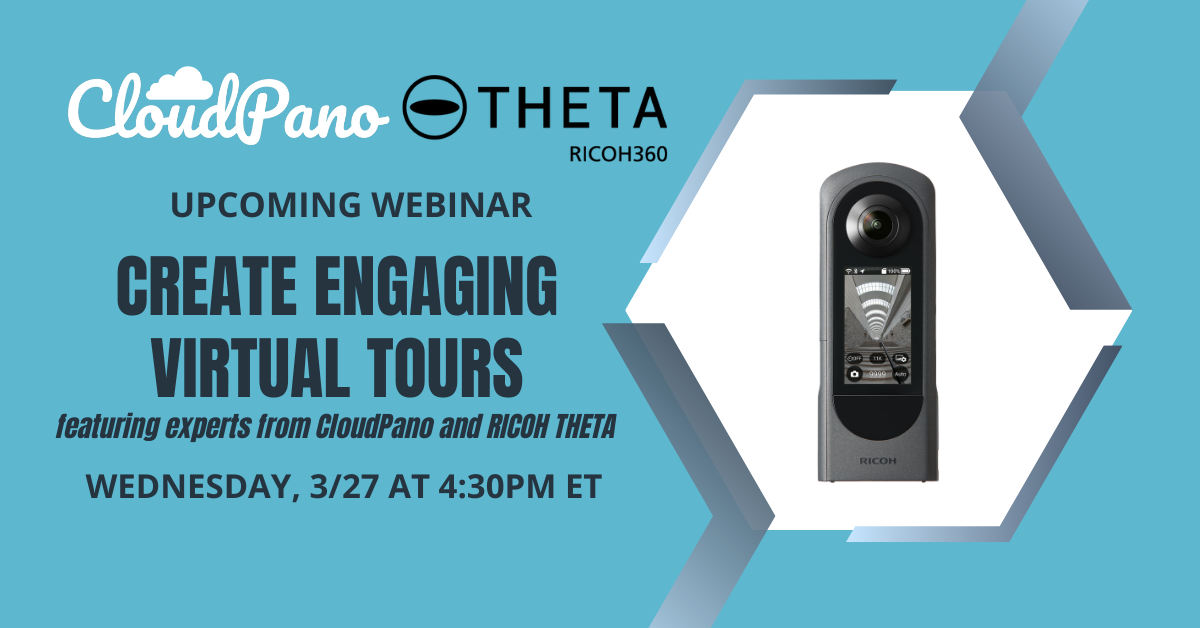Ricoh is currently pursuing initiatives based on the strategy of shifting from being an OA (office automation) manufacturer to be a digital service company. Digital service company is defined as “a company that supports the creativity of working people and provides services that transform the workplace, that connects offices and frontlines, and achieves productivity improvements with digital technologies.”
We interviewed Ricoh Company Ltd. President Yoshinori Yamashita about his expectations for the RICOH THETA 360-degree camera that will play a part in this. He was speaking with Shinobu Fujiki, General Manager of THETA Business Division.
Where THETA Fits in Ricoh as a Digital Service Company
Fujiki: The THETA was released as a consumer product in 2013, but over the past few years, a range of services that share a strong affinity with THETA have emerged, and in addition to new features and models, we have also focused on appealing to the business sector.
Today, the THETA is being used by many people for business use as well. Mr. Yamashita, as Ricoh shifts to being a digital service company, where do you feel the THETA business fits in?

Yamashita: The THETA delivers important image information to our sense of sight, and of the five human senses, sight is able to recognize the most information. With its ability to capture with a single shot and digitize all of that information, I think it is an ideal device for businesses. Ricoh’s strength lies in its ability to add value to customers’ data and provide that as a service. We do that by providing edge devices and having customers keep them around.
Now, for example, THETA360.biz provides services such as virtual tours as a solution business, and its sales have grown rapidly. I think it is thanks to THETA that we have been able to provide devices and services unique to Ricoh.
At the moment, Ricoh is mainly responsible for introducing digital services to customers’ office environments, but we have not made much progress in the digitization of manufacturing plants and sales outlets yet. As a first step toward digitization on the frontlines, THETA captures images. That is why we recognize that THETA will be a very important edge device.

Yamashita: As Ricoh shifts to being a digital service company going forward, as well as providing products and services beside customers, it will be crucial to have a solution and platform perspective in terms of what kind of value we can add to the data that we have acquired from customers*1.
In the future, the hope is to make even greater use of THETA as an edge device and develop it into a platform business that will drive Ricoh.
*1
Solution business: A business that provides solutions meeting the needs of specific customers as services
Platform business: A business like Amazon or Google that provides a platform for services targeting a wide range of users
Arrival of the Flagship Model THETA Z1, Pursuing Image Quality
Fujiki: When the THETA first went on sale, we targeted early-adopter consumers who enjoy new video experiences, and it has been well received in that sense. But when we started to think about utilizing THETA for business use, we realized that it lacked the requisite quality in terms of images and other factors.
For that reason, I think our honest pursuit of quality improvements to those areas have been a key to the growth in sales to the business sector.

Yamashita: When the THETA was first released, I would often take it to show off when visiting customers. When I would show it in that sort of setting, often the CTOs of the other companies would come up with ideas about how they thought they could use THETA in a certain area of their own business.
I think that allowed THETA to be utilized in business was a balance between two factors: the evolution of the THETA devices themselves, and the increasing number of ideas for business-focused services.

[Skeleton model designed to show the internal structure of the THETA Z1]
Fujiki: On the point of THETA’s evolution, the THETA Z1 was released as the flagship model of the THETA lineup in May 2019. We incorporated a 1.0-inch sensor and designed it to produce the highest image quality for a compact 360-degree camera that can be held with one hand.
We managed to make the body of the THETA this thin while maintaining the distance from lens to sensor using Ricoh’s folded optics technology. Even if a competitor tries to make something similar, that probably can’t do it at this size. This is exactly the ultimate product that could be made using Ricoh’s optical technologies.

[Skeleton model of the THETA Z1]
Fujiki: A wide variety of customers use THETA products as consumer devices, but we are also seeing a growing number of usage scenarios in the business world, from real estate and used vehicles to building and construction sites. Recently there have been growing demands for live streaming 360-degree video for business purposes. Even in an environment with a temperature of 30 degrees Celsius, the THETA Z1 supports continuous 24-hour live streaming operation.
If it was only a consumer device, we wouldn’t need to provide that degree of support, but considering the potential business applications, supporting those kinds of features was seen as necessary.

Yamashita: In having customers use THETA for business, you need to consider things in terms of individual types of business. For example, since THETA devices have wide angle lenses, images of faraway locations appear extremely small, but at a factory and other frontline locations, there is a need to get the best possible look at inaccessible locations. In that way, I hope the THETA lineup advances further on the hardware side to address the requirements of each type of business.
Increased Demand for THETA During the COVID-19 Pandemic
Fujiki: Speaking of the demand for THETA, we have seen a sharp increase in global demand during the current COVID-19 pandemic for things like virtual tours. But this is not something temporary. I think it is an irreversible force of change happening in the world, and if anything demand is going to rise rather than fall. What are your thoughts on this, Mr. Yamashita?
[THETA Image: With members of the distributor in South Africa]
Yamashita: During the COVID-19 pandemic, I think people are actively seeking out changes at this stage. They are thinking of what they can use to substitute for the things they can no longer do, or in reverse, they are realizing that they never needed to do something in the first place. But the unnecessary things that were forcibly substituted will eventually go away.
It’s important to substitute for the things that essentially require substitution, so even when THETA is going to be used to substitute for something in the customer’s workflow, I hope we can work with that customer to carefully examine what things are inherently necessary for the customer.
THETA as a Consumer Product
Fujiki: On the other hand, TEHTA was originally planned as a consumer product. What are your thoughts on the THETA for consumer use?
Yamashita: We often refer to the types of B-to-B (business) and B-to-C (consumer), but I think the lines between “to-B” and “to-C” are quite blurred. In today’s world, we can’t easily draw a boundary between consumer and business. There are people and industries that shift back and forth across that divide. The same goes for the definition of “B-to-C.” It no longer has the traditional image of “white goods” and has changed considerably with advancements in software.
[THETA Image: With members of US-based Elixirgen Scientific]
Fujiki: As you mentioned, there are few boundaries separating consumer and business uses, and that is precisely what we are tasked with working on at the moment.
There are people such as lawyers, designers and architects who use THETA for work purposes to record what is happening on site, and who use it in their personal lives for travelling or recording family memories. If you also consider where those people purchase a THETA, such as a consumer-oriented online purchasing route, you can feel how markedly the divide between B-to-B and B-to-C is disappearing.

Yamashita: People have three kinds of time: sleep, work, and leisure. In the case you described, if the person uses the product during leisure time, we regard it as consumer use, and if they use it during work time, we say it is business use, but from the perspective of the individual customer, all people are participants in both the B-to-B world and the B-to-C world.
Just now you gave an example of a lawyer as one type of user, but even among ordinary office workers, I bet there are some who think “I reckon this camera I used for camping could be used for work as well.” The concepts of B-to-B and B-to-C are only references made from the perspective of the company side. If you look from the customer perspective, these people see the potential of the products for both business and consumer use.
I think that is when the THETA’s value as a device includes the fact that it can be used for both purposes.
To achieve further growth of THETA going forward, it will be important to continue providing value to customers without boundaries that separate consumer and business use.

Expectations for THETA
Fujiki: In closing, I would like to ask you about your future expectations for THETA, and also for a message to the team members involved with the THETA business.
Yamashita: I hope the team members involved in the business realize that THETA is something that fulfills dreams but also serves beneficial purposes in the world. Of course in a business setting it has the potential to improve the productivity of workers, but in a consumer setting, it can also give memories and fun to people in all kinds of ways, and create an uplifted feeling that has never before been experienced.
[THETA Z1 Ichimura Prize Award Ceremony]
Yamashita: THETA is also a pioneering device that captures and digitizes information in a single shot and delivers important image information to our sense of sight, which recognizes the most information of the five human senses.
We are providing the most unique devices and services in the world. THETA is an important business spearheading those efforts, and I think it is a crucial device. Keep up the great work, and I look forward to what the future will bring.

For more details, please visit the product page.

Edit:Hirakawa, Photo:Ohara



![[Conversation] Expectations for the THETA amid Ricoh’s Transition to a Digital Service Company:Ricoh President Yoshinori Yamashita and THETA Business Division General Manager Shinobu Fujiki](https://assets-global.website-files.com/639018b31279b3258306183a/639c56434d03cc6c05cf9526_IMGP8606.jpeg)
.jpg)


.svg)




